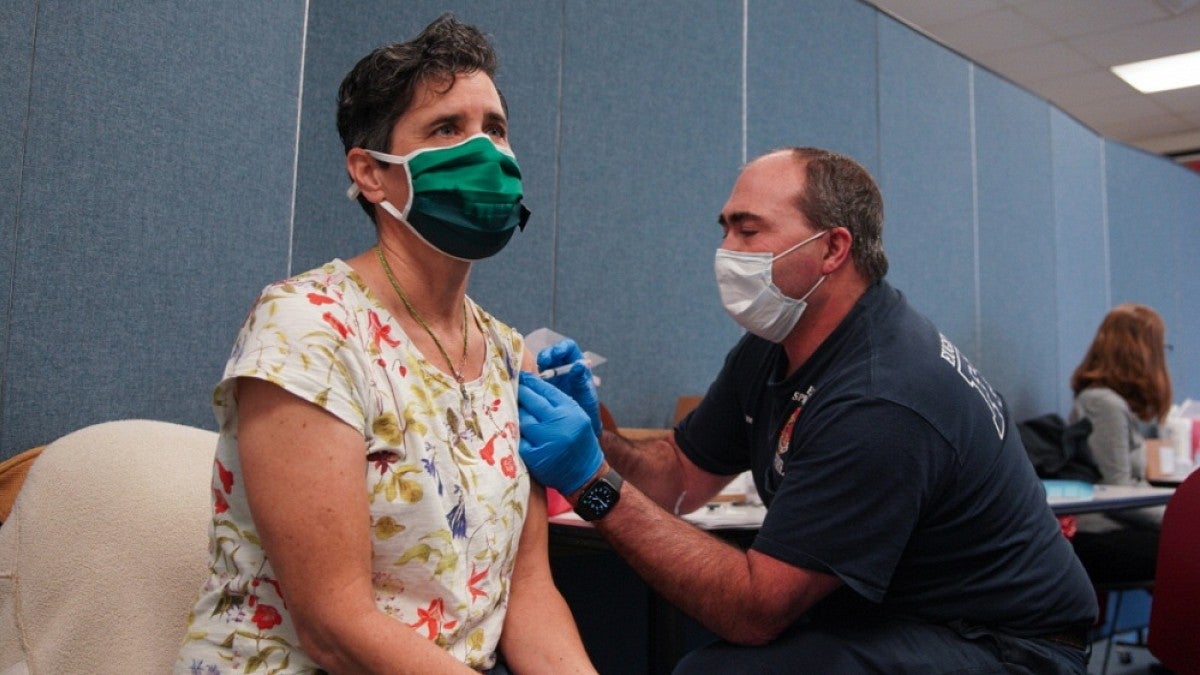University Health Services workers recently rolled up their sleeves and received their first COVID-19 vaccination, putting them among the first eligible employees at the University of Oregon to receive their inoculations.
Mary Ann Petersen took part in the January vaccination clinic hosted at a Eugene fire station. She expressed a huge sense of relief that she and her co-workers were now halfway toward being fully vaccinated.
“I feel amazingly fortunate,” said Petersen, who is an acupuncturist who cares for students seeking relief for headaches or other stress-related ailments.
“Personally, in my role as a citizen in our country, I thought that was the wisest thing to do,” she said of receiving the vaccine. “I didn’t want to be a spreader, and I was moving through different groups of different ages. I thought, ‘What If I start carrying it around with me and start spreading it?’ That was a motivation.”
Petersen and the other University Health Services employees qualified for the vaccination under Oregon’s prioritization plan. The state sequencing is based on guidance from the federal Centers for Disease Control and Prevention. Counties manage distribution of vaccinations adhering to those state guidelines, working with local public partners and agencies to administer them.
The UO is working with Lane County Public Health to provide access to vaccinations to its employees and students according to the state prioritization plan.
“These are the first steps to our university and community getting back to a new kind of normal,” said Krista Dillon, the UO’s director of operations in Safety and Risk Services. “We still have a long process before everyone in the UO community has access to vaccines, but vaccinating our front-line health care workers is a critical first step that inspires hope and optimism for the future.”
It remains unclear when COVID-19 vaccinations may begin for faculty, staff and students. However, it is possible that state guidelines will allow some employees to receive a vaccine due to personal circumstances through a health care provider, pharmacy or public health clinic before it is available through the university’s process.
The first eligible UO employees included health care workers, both those providing direct patient care and those providing support within the health center, because the nature of their work means they are more likely to be exposed to the virus. In addition, employees who provide COVID-19 testing and contact tracing, those involved in child care, and early learning educators are prioritized in the state queue to receive the vaccine.
“We are coordinating closely with county and state public health authorities about the vaccine’s availability,” Dillon said. “We will ensure that those who are eligible to receive the vaccine have an opportunity to get it as soon as it is available. But the allocation of vaccines is ultimately up to the state and relies on how much is made available to them.”
More UO employees are expected to be eligible for vaccination as distribution expands to include more higher education employees. Students are expected to be eligible later in the process, which could last many months as the vaccine distribution is constrained by supply.
Before receiving the Moderna vaccine, Petersen did her research. She read literature and talked with pharmacist and nurse friends whose opinions she trusted.
Debra McLaughlin, a compliance officer at the health center who supervises patient services among other responsibilities, also saw getting vaccinated as doing her due diligence as a citizen.
“I did it for my own immunity and health,” McLaughlin said, “and also because I believe in the benefits of immunization and herd immunity.”
Rebecca Schunicht Johnson was also part of a group of University Health Services workers to get vaccinated during a recent clinic, and she was fully on board.
“I do have a couple of underlying health conditions, so for me it meant a lot to get the vaccine,” Johnson said. “Plus, in the climate I work in, it brought a sense of safety and security for me.”
She also takes care of her elderly mother-in-law, who relies on her for companionship and care.
“I want to be sure I’m taking the best precautions possible,” said Johnson, who this month worked at a COVID-19 vaccination clinic held on campus for the next round of UO employees to receive the vaccine and did the same at a meningitis clinic on campus in 2015.
She added that she sees taking the vaccine as a personal responsibility that has a larger purpose.
“It’s very important what we can not only do for ourselves but for each other; what about someone who can’t get vaccinated because they are immunocompromised?” she asked. “It’s not just about you, it’s for the greater good. It’s about trying to protect people who can’t protect themselves.”
—By Jim Murez, University Communications


